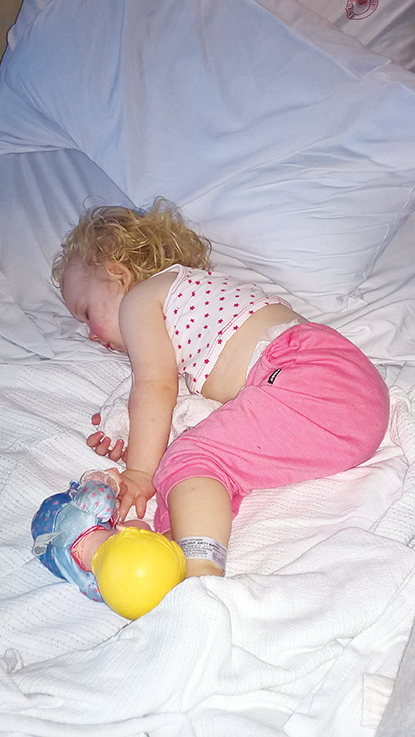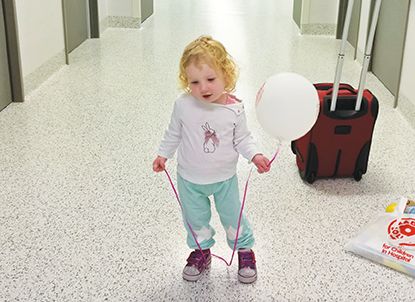To be a parent is to expect the unexpected—you hear that all the time. But no-one tells you that raising children is like living on a fault line. You can stock an emergency survival kit and write out a plan for when the earthquake hits, but the moment the ground actually shakes will still catch you off guard. And it wasn’t until I was in the paediatric intensive care unit, cradling my critically ill toddler, that I realised I should have seen the signs.
It began as a cold like any other ordinary cold: first the telltale sneezing, then the runny nose. It was something I’d become well accustomed to ever since she started attending daycare, and I did what I had always done to ease her symptoms. I fed her buttered toast soldiers with the crusts cut off along with warm apple sauce and spoonfuls of lactose-free yoghurt. I kept her warm and dressed her in extra layers and vigilantly gave her carefully measured doses of paracetamol whenever her temperature rose above 37.5°C.
But her cold didn’t improve. She lost her appetite, grew listless and, most worryingly, her voice began to sound muffled, like she had marbles in her mouth. When her fever spiked at 40°C, I panicked and rushed her to hospital.
It was a busy Monday night and we had to wait a couple of hours. When the paediatric doctor finally got to us, he took a quick look in her ears and mouth and said she just had a viral sore throat. She didn’t even need antibiotics.
My first reaction was relief—she isn’t going to die. My second reaction was doubt: Is it really just a viral sore throat? Sure, her tonsils were inflamed. But I’d never seen her this sick. I looked down at my daughter again. Pasty lips, drooling mouth. And I wondered what made the doctor so sure.
Nevertheless, I took her home, and whenever her fever spiked, whenever she didn’t eat, whenever she’d only take half a mouthful of water, whenever she’d start drooling, I’d reassure myself that she only had a viral sore throat and she would get better soon.
This was a decision I came to bitterly regret when, four days later, I found myself back in the emergency room, listening to an ear, nose and throat specialist explain to me that my daughter had a large, life-threatening neck abscess that had to be drained immediately. It needed to be done while she was still able to breathe, and there was a risk of damage to her facial nerves, which could result in permanent facial paralysis and speech impairment.
Have you ever wanted to run away from a fearful situation but you knew you couldn’t? That was pretty much how I felt as I restrained my two-year-old daughter while the anaesthetist put her to sleep. It’s the hardest thing I’ve ever had to do since becoming a mum, and the hurt I felt at seeing her suffer was more than just emotional; it was physical.
My hand, which was pressing her little forehead down on the operating table, shook, while my other hand, which was clutching her struggling wrists, was so sweaty she almost slipped from my grasp. There was a hot, sharp pain in my throat, and my tongue seemed to stick to my teeth as I told her I loved her and that everything would be OK. Guilt and worry squeezed my heart: Why is this taking so long? If only I’d acted sooner. What if the scalpel slips?
Sounds of metal and electronic beeping and the gas mask hissing filled the operating room, but my ears managed to hear only her screams. Then, finally, my vision blurred as the sedative flowed into her tiny veins, and I witnessed the moment her struggling stopped. But I could still see the terror in her eyes.

I can’t recall everything that happened from moment to moment while my daughter was in hospital, but I can measure our time in events: sitting silently in the corner of the waiting room, trying not to cry as I imagined the scalpel blade piercing her throat; seeing her intubated and unconscious in the paediatric intensive care unit, lines running from her body like a spiderweb; then, after she was awake and the tube from the surgery had been removed from her nose, uttering useless words of comfort while she screamed as they wrapped her tightly in a blanket (effectively a straitjacket) so they could force a feeding tube down her nose.
The six days we spent afterwards in the children’s ward blended into a haze of nurses’ checks, doctors’ rounds, beeping alarms, hospital food and torn out IVs. But when I look back on that week, when I try to make some sense of it all, the first thing that keeps coming to my mind is, why didn’t I trust my instincts?
It’s a thought that has tortured me. I wasn’t assertive enough. Why didn’t I insist on a second opinion? I should have brought her back to the emergency room sooner. We could have avoided surgery if I’d demanded she be given antibiotics at our first emergency visit.
My friends tell me not to beat myself up. I’m not a doctor. I had no way of knowing that a deadly bacteria—known as Fusobacterium necroforum—had formed an abscess in my daughter’s throat. But I can’t stop the voice inside my head, softly and persistently accusing: you knew it was more than just a viral infection.
Being a parent can sometimes feel like I have the Midas touch in reverse: that I’m the kind of mother who has the best of intentions but everything I do turns to dust. The kind of mother who feels like an actor on stage. The kind of mother who is always unsure whether what she’s doing is correct.
When you take your child home after spending six days in hospital, the life that you left behind feels trivial. Rather than celebrating, you find yourself trying to reclaim those pieces of yourself that you lost somewhere between the operating room and the hospital’s corridors.
You constantly watch your child. You try to salvage any smidgen of self-confidence you might have as a parent and try to accept that you made a mistake. But every time you make a decision, you can’t stop the gnawing thought that maybe you’ve made the wrong call.
I used to believe that raising a child was going to be the most joy-filled time of my life. And it has been for much of the time. But here’s the truth: parenting is also painful. Caring for your child—feeling their hurt when they hurt themselves and kissing their tears when their tears flow—is painful. Loving them till your heart aches is painful.
And as much as I’d like to believe there’s a formula for raising happy, healthy kids, I’ve come to realise that there’s no set of guidelines and no universal rulebook. All we can do, in the end, is learn to listen to ourselves.
Because somewhere between what you think you should do and what you actually end up doing is a quiet space where our perceptions form and our intuition finds its voice.
We’re not always going to be right. But it’s our responsibility as parents to take note of that voice, to have faith in ourselves and to act according to our instincts.
My daughter is well now. The other day we were looking at the little photo booklet I made of her hospital “adventure”. We came across a picture of her on the bed with her IV snaking from her bandaged hand and a plastic bracelet circling her ankle.
She looked at me, and then she looked at the picture. For a moment, I thought she might think it was someone else. Then she smiled at me and said, “I asleep in the hospital.”
“You slept a lot,” I said and took her gently in my lap.
She sat there looking at the photos. I watched her flip to the one at the end—the one where she’s standing in the hospital corridor in front of her little red suitcase, white balloon in hand, ready to come home.
“You were very brave,” I said.
WIN CHILDREN’S BOOKS!
Submit a personal story on your parenting journey, thoughts or experience and if we use your story, we’ll send you a selection of children’s books! Write to us at editorial@mumsatthetable.com.
How helpful was this article?
Click on a star to rate it!
4.3 / 5. 4
Be the first to rate this post!
Suvi Mahonen
Related posts
Subscribe
Receive personalised articles from experts and wellness inspiration weekly!

